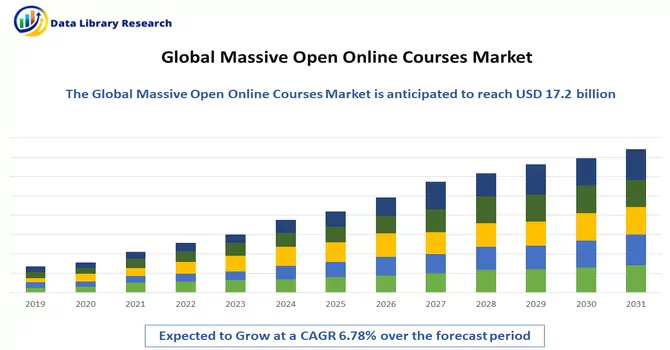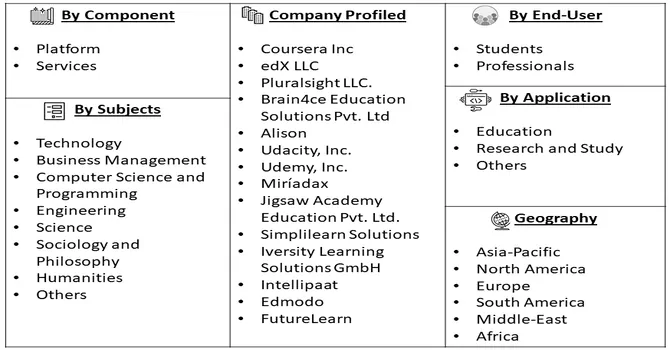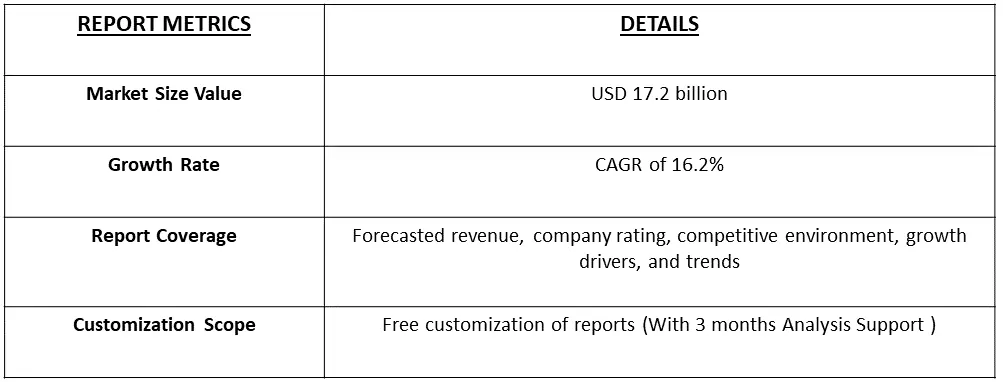The Massive Open Online Courses (MOOC) Market size is expected to grow from USD 17.2 billion in 2023 and is expected to register a CAGR of 16.2% over the forecast period, 2023-2031.

Get Complete Analysis Of The Report - Download Free Sample PDF
Massive Open Online Courses (MOOCs) are online educational courses that are designed to be open to a large number of participants, often without specific prerequisites. MOOCs are accessible to anyone with an internet connection and are typically offered by universities, colleges, or other educational institutions. They provide a platform for learners from around the world to access high-quality educational content, including video lectures, readings, quizzes, and interactive forums.
MOOCs break down geographical barriers, providing individuals worldwide with access to high-quality education. This global reach increases the potential user base for MOOC platforms. Also, MOOCs often offer affordable or even free access to educational content, making them an attractive option for learners seeking cost-effective alternatives to traditional education. Moreover, MOOC platforms leverage data analytics to track learner progress and preferences. Personalized learning experiences, tailored to individual needs, contribute to better engagement and improved learning outcomes. Thus, these factors are expected to drive the growth of the studied market over the forecast period.
Market Segmentation:The Global Massive Open Online Courses (MOOCs) Market, is Segmented By Component (Platform, and Services), Subjects (Technology, Business Management, Computer Science and Programming, Engineering, Science, Sociology and Philosophy, Humanities, Education and Training, Healthcare and Medicine, Arts and Design, Mathematics, Foreign Language Learning, Others), Application (Education, Research and Study, Others), End User (Students, and Professionals) and Geography (North America, Europe, Asia Pacific, Latin America, Middle East & Africa). The market sizes and forecasts are provided in terms of value (in USD Billion) for all the above segments.

For Detailed Market Segmentation - Download Free Sample PDF
MOOCs provide opportunities for individuals to acquire new skills and knowledge relevant to their careers. Many MOOCs offer certifications, which can enhance a learner's professional profile. MOOCs are increasingly utilized by businesses for employee training and development. Corporate partnerships with MOOC platforms drive demand for courses that address specific industry needs and skills gaps. Thus, these market trends are expected to contribute to the growth of the studied market.
Market Drivers:
The Widespread Availability and Accessibility of Massive Open Online Courses (MOOCs)
The widespread availability and accessibility of Massive Open Online Courses (MOOCs) have revolutionized the landscape of education, breaking down traditional barriers and offering learning opportunities to a global audience. MOOCs are characterized by their open enrollment, allowing learners from diverse backgrounds, geographical locations, and socioeconomic statuses to access high-quality educational content without constraints imposed by traditional educational models. The advent of online platforms has democratized education, making it possible for individuals to engage in courses offered by prestigious universities and institutions from the comfort of their homes. The accessibility of MOOCs is not limited by geographical boundaries, enabling learners to transcend regional limitations and connect with educational resources from around the world. The widespread availability and accessibility of MOOCs contribute to the democratization of education, fostering a culture of continuous learning and skill development. As technology continues to advance, MOOCs play a pivotal role in making education inclusive, reaching individuals who may have been excluded from traditional educational pathways. This transformative impact not only empowers individual learners but also addresses the global demand for lifelong learning in an ever-evolving knowledge economy. Thus, owing to such factors the market is expected to witness significant growth over the forecast period.
Cost-effectiveness of Online Courses
The cost-effectiveness of online courses has emerged as a compelling factor in reshaping the educational landscape, making quality learning more affordable and accessible to a diverse range of individuals. Online courses often have lower tuition fees compared to their traditional counterparts. Institutions offering online programs can save on physical infrastructure, maintenance, and other overhead costs, allowing them to pass on the financial benefits to students. This reduction in tuition fees makes education more economical for a broader demographic. For instance, an article published by the journal in April 2022, reported that online courses are 25.6% cheaper than offline courses. As a result, it becomes easy for students and working professionals to access it, thereby contributing to the growth of the studied market.
Market Restraints:
Limited interaction and feedback limits market growth
Online courses, particularly massive open online courses (MOOCs), often cater to a large number of participants simultaneously. This scale can result in reduced opportunities for personalized attention and interaction between instructors and individual students. The absence of personalized guidance may hinder the learning experience for some learners who require additional support or clarification. Moreover, traditional classroom settings facilitate real-time interaction between students and instructors, fostering dynamic discussions and immediate clarification of doubts. Online courses, especially those delivered asynchronously, may lack real-time interaction, leading to delays in receiving feedback and addressing queries. This delay can affect the pace of learning and student motivation. Thus, such factors are expected to slow down the growth of the studied market.
The COVID-19 pandemic has had a significant impact on the Massive Open Online Courses (MOOCs) market, leading to both challenges and opportunities. With widespread lockdowns and social distancing measures, traditional educational institutions had to transition quickly to online learning. This shift led to a surge in demand for online education solutions, including MOOCs, as people sought to continue their education remotely. Many universities and colleges, forced to adapt to the challenges of the pandemic, collaborated with MOOC platforms to offer courses online. This collaboration not only ensured the continuity of education but also expanded the reach of these institutions to a global audience. Also, an article published by Harvard University, in April 2023, reported that a 56.7% increase in the adoption of online courses was observed, during 2020-2021. Thus, these trends increase the demand for online courses, thereby driving the growth of the studied marker. In the current scenario, with the ease of convenience offered by these courses, the market is expected to witness significant growth over the forecast period.
Platform Segment is Expected to Witness Significant Growth Over the Forecast Period
Massive Open Online Courses (MOOCs) have gained immense popularity in recent years, largely due to the emergence of dedicated online platforms that host and deliver these courses. These platforms play a pivotal role in shaping the accessibility, structure, and overall success of MOOCs. Numerous online platforms have emerged to host MOOCs, each offering a unique set of features and services. Prominent platforms include Coursera, edX, Udacity, and FutureLearn, among others. These platforms serve as digital hubs where institutions and educators can publish and administer their courses to a global audience.
Moreover, MOOC platforms facilitate global access to education by providing a centralized space for learners to explore and enrol in a wide array of courses. This global accessibility eliminates geographical barriers and allows learners from different parts of the world to access high-quality educational content. The success of MOOCs heavily relies on the robust technological infrastructure of the hosting platforms. This includes reliable video streaming, secure assessment tools, and user-friendly interfaces. The seamless integration of these elements contributes to a positive and effective learning experience. Thus, owing to such advantages, the segment is expected to witness significant growth over the forecast period.
Technology Segment is Expected to Witness Significant Growth Over the Forecast Period
Technology plays a crucial role in shaping the landscape of Massive Open Online Courses (MOOCs), influencing the design, delivery, and accessibility of online education. Technology enables the creation and maintenance of dedicated online learning platforms that host MOOCs. These platforms, such as Coursera, edX, and Udacity, provide a digital infrastructure for institutions and educators to deliver courses to a global audience. The platforms facilitate course enrollment, content delivery, and interaction among participants. AI technologies, including natural language processing and machine learning, are increasingly being employed in MOOCs. AI can assist in automated grading, personalized content recommendations, and chatbot-driven support, enhancing the efficiency and effectiveness of online education. Thus, owing to these factors, the market is expected to witness significant growth over the forecast period.
Education Segment is Expected to Witness Significant Growth Over the Forecast Period
Massive Open Online Courses (MOOCs) have significantly impacted the field of education, introducing new possibilities for learning and democratizing access to diverse educational content. MOOCs often offer a cost-effective alternative to traditional education. Many courses are available for free, allowing learners to access valuable content without the financial burden associated with formal education. This affordability enhances access to education for individuals who may not have the means to pursue traditional academic paths. MOOCs play a crucial role in addressing the need for continuous skill development in a rapidly evolving job market. Professionals can enrol in courses to acquire new skills, stay current with industry trends, and enhance their marketability in their respective fields. Thus, owing to benefits, the segment is expected to witness significant growth over the forecast period.
Professionals Segment is Expected to Witness Significant Growth Over the Forecast Period
Professionals across various industries are increasingly turning to online courses to enhance their skills, stay current with industry trends, and advance their careers. The intersection of technology and education has given rise to a diverse array of online courses catering to the specific needs of professionals. Online courses provide professionals with the opportunity for continuous learning and skill enhancement. As industries evolve, staying updated on the latest developments is crucial, and online courses offer a convenient way to acquire new knowledge and competencies. Professionals often face time constraints due to their demanding schedules. Online courses, with their on-demand nature, allow individuals to learn at times that suit them best. This time efficiency is especially valuable for professionals juggling work, family, and other commitments. Thus, owing to such benefits, the segment is expected to witness significant growth over the forecast period.
Asia Pacific Region is Expected to Witness Significant Growth Over the Forecast Period
The Asia-Pacific (APAC) region has experienced significant growth and engagement with Massive Open Online Courses (MOOCs), reflecting the global trend of digital education adoption. The Asia-Pacific region is home to a diverse and rapidly growing population, representing a vast market for online education. Countries like China, India, Japan, South Korea, and Australia have seen a surge in the demand for MOOCs as individuals seek accessible and flexible learning opportunities. MOOCs in the Asia-Pacific region play a crucial role in addressing educational gaps and providing access to high-quality courses. In some areas where traditional educational resources may be limited, online courses offer a means to bridge the educational divide.
For instance, in 2023, the Asia Pacific Society of Clinical Microbiology and Infection (APSCMI) entered into a significant partnership in late 2021. A collaboration was established with bioMérieux, a prominent company specializing in infectious diseases diagnostics. Over the span of two years, a dedicated team of Clinical Microbiologists nominated by APSCMI, together with medical affairs professionals from bioMérieux, worked diligently to develop an E-Learning course titled "Microbiology in Clinical Practice." The collaborative effort involved the meticulous crafting of six E-Learning modules covering various clinical aspects of microbiology. The objective was to enhance decision-making in patient management within modern clinical settings. It is with great pleasure that we announce the completion of the course development. To celebrate this achievement, the official launch of the E-Learning course is scheduled for November 27, 2023. The launch event will take place from 17:00 to 19:00 (Singapore time). All interested parties, whether in Singapore or connecting remotely, are cordially invited to be part of this momentous occasion. Thus, such developments are continuously boosting the studied market growth in the region.

Get Complete Analysis Of The Report - Download Free Sample PDF
The competitive landscape of the Massive Open Online Courses (MOOCs) market encompasses details about each competitor. This includes an overview of the company, financial information, revenue generation, market potential, investment in research and development, initiatives in new markets, global presence, production sites and facilities, production capacities, strengths and weaknesses of the company, product launches, product range, and application dominance. It's important to note that these data points are specific to each company's focus on the MOOCs market. Some of the major market players working in this market segment are:
Recent Development:
1) In June 2022, The CareerSource Florida Board of Directors affirmed Governor Ron DeSantis' unwavering commitment to positioning Florida as the foremost veteran-friendly state and a national leader in workforce education and economic growth. They have greenlit an allocation of approximately USD 20 million in discretionary job training funding to advance several key initiatives. These include targeted upskilling programs for veterans, support for the aviation, aerospace, and defence industries, enhancing 2021 initiatives for both veterans and Floridians striving for self-sufficiency, and the creation of pathways to prosperity for low-income, single, and pregnant women through paid work-based learning. Additionally, the funding will sustain programs such as Incumbent Worker Training and targeted rural initiatives. The overarching goal is to synergize these investments across all state agencies involved in bolstering Florida's workforce, with a particular emphasis on advancing apprenticeship and work-based learning efforts.
2) In 2022, Microsoft will offer a 12-week summer internship program tailored for first- and second-year college students. This program provides hands-on experience across key phases of the product development cycle: Design, Build, and Quality. Interns work collaboratively in pods, gaining practical insights into software development. The program emphasizes on-the-job learning, supplemented by mentorship, community building, and networking opportunities.
Q1. What was the Massive Open Online Courses Market size in 2023?
As per Data Library Research the Massive Open Online Courses (MOOC) Market size is expected to grow from USD 17.2 billion in 2023.
Q2. At what CAGR is the Massive Open Online Courses (MOOC) market projected to grow within the forecast period?
Massive Open Online Courses (MOOC) market is expected to register a CAGR of 16.2% over the forecast period.
Q3. What are the factors driving the Massive Open Online Courses (MOOC) market?
The Widespread Availability and Accessibility of Massive Open Online Courses (MOOCs) and Cost-effectiveness of Online Courses are the factors driving the Massive Open Online Courses (MOOC) market.
Q4. What segments are covered in the Massive Open Online Courses (MOOC) market Report?
By Component, By Application, End-User and Geography these are the segments covered in the Massive Open Online Courses (MOOC) market Report.
Data Library Research are conducted by industry experts who offer insight on industry structure, market segmentations technology assessment and competitive landscape (CL), and penetration, as well as on emerging trends. Their analysis is based on primary interviews (~ 80%) and secondary research (~ 20%) as well as years of professional expertise in their respective industries. Adding to this, by analysing historical trends and current market positions, our analysts predict where the market will be headed for the next five years. Furthermore, the varying trends of segment & categories geographically presented are also studied and the estimated based on the primary & secondary research.
In this particular report from the supply side Data Library Research has conducted primary surveys (interviews) with the key level executives (VP, CEO’s, Marketing Director, Business Development Manager and SOFT) of the companies that active & prominent as well as the midsized organization
FIGURE 1: DLR RESEARH PROCESS

Extensive primary research was conducted to gain a deeper insight of the market and industry performance. The analysis is based on both primary and secondary research as well as years of professional expertise in the respective industries.
In addition to analysing current and historical trends, our analysts predict where the market is headed over the next five years.
It varies by segment for these categories geographically presented in the list of market tables. Speaking about this particular report we have conducted primary surveys (interviews) with the key level executives (VP, CEO’s, Marketing Director, Business Development Manager and many more) of the major players active in the market.
Secondary ResearchSecondary research was mainly used to collect and identify information useful for the extensive, technical, market-oriented, and Friend’s study of the Global Extra Neutral Alcohol. It was also used to obtain key information about major players, market classification and segmentation according to the industry trends, geographical markets, and developments related to the market and technology perspectives. For this study, analysts have gathered information from various credible sources, such as annual reports, sec filings, journals, white papers, SOFT presentations, and company web sites.
Market Size EstimationBoth, top-down and bottom-up approaches were used to estimate and validate the size of the Global market and to estimate the size of various other dependent submarkets in the overall Extra Neutral Alcohol. The key players in the market were identified through secondary research and their market contributions in the respective geographies were determined through primary and secondary research.
Forecast Model
